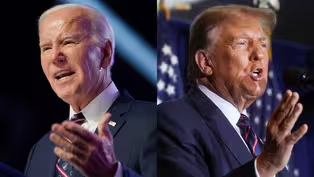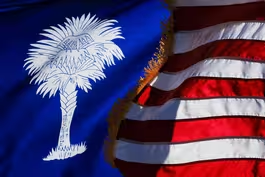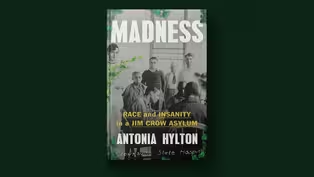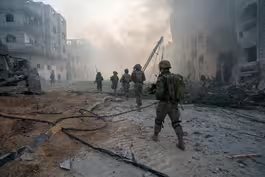
Experts discuss threat posed by Iran, fears of regional war
Clip: 1/24/2024 | 11m 44sVideo has Closed Captions
Experts weigh in on threat posed by Iran and line U.S. is walking to avoid regional war
A U.S. priority since the Oct. 7 Hamas attack has been preventing violence from expanding across the region. But overnight, the U.S. launched strikes at Iranian-backed groups in both Iraq and Yemen, following attacks by those groups. Nick Schifrin reports on the widening military campaign and the threat posed by Iran and gets two views on the exchange of fire from Michael Doran and Ali Vaez.
Problems playing video? | Closed Captioning Feedback
Problems playing video? | Closed Captioning Feedback
Major corporate funding for the PBS News Hour is provided by BDO, BNSF, Consumer Cellular, American Cruise Lines, and Raymond James. Funding for the PBS NewsHour Weekend is provided by...

Experts discuss threat posed by Iran, fears of regional war
Clip: 1/24/2024 | 11m 44sVideo has Closed Captions
A U.S. priority since the Oct. 7 Hamas attack has been preventing violence from expanding across the region. But overnight, the U.S. launched strikes at Iranian-backed groups in both Iraq and Yemen, following attacks by those groups. Nick Schifrin reports on the widening military campaign and the threat posed by Iran and gets two views on the exchange of fire from Michael Doran and Ali Vaez.
Problems playing video? | Closed Captioning Feedback
How to Watch PBS News Hour
PBS News Hour is available to stream on pbs.org and the free PBS App, available on iPhone, Apple TV, Android TV, Android smartphones, Amazon Fire TV, Amazon Fire Tablet, Roku, Samsung Smart TV, and Vizio.
Providing Support for PBS.org
Learn Moreabout PBS online sponsorshipattack has been preventing violence# from expanding across the region.
But, overnight, the U.S. launched# strikes at Iranian-backed groups in## both Iraq and Yemen following attacks# by those groups.
And once again today,## Houthi rebels fired missiles# at multiple American ships.
Nick Schifrin looks at the widening U.S.# military campaign and the threat posed by Ir NICK SCHIFRIN: Just after midnight in Iraq,# U.S. strikes targeted an Iranian-backed militia.## Two hours later, in Yemen, the U.S. military# targeted Iranian-backed Houthi rebels, strikes## in two different Middle Eastern countries against# two different Iranian-supported groups designed,## in the words of National Security Council# spokesman John Kirby, to prevent wider war JOHN KIRBY, NSC Coordinator For Strategic# Communications: We don't want to see the## conflict escalate.
We do for a war or conflict with anybody.# We're actually trying to NI CK SCHIFRIN: Iran's Revolutionary Guard# Corps has long supported what Iran calls## an axis of resistance to conduct# forward defense against its enemies.
In Iraq, that includes Kataib Hezbollah,# a Shia paramilitary group that the U.S.## labels terrorists, but is also part of the Iraqi# military that helped defeat ISIS.
Last weekend,## the U.S. military says the group fired# rockets and ballistic missiles at this## U.S. military base, Al Asad, causing --# quote -- "a number of American injuries."
The U.S. military says last night's# U.S. strikes target a Kataib Hezbollah## headquarters, storage and training sites.
JOHN KIRBY: We're not going to hesitate# to take necessary acti troops and our facilities, and we# will stay vigilant going NI CK SCHIFRIN: But Iraqi Prime Minister Mohammed# Shia' -- "irresponsible escalation" after reiterating# a threat to push U.S. troops out of Iraq.
MOHAMMED SHIA' AL-SUDANI, Iraqi Prime Minister# (through translator): After the repercussions## and attacks on t start this dialogue immediately# in order to reach an agreement## on arranging a timetable for the end of# the mission of international ad NICK SCHIFRIN: In Yemen, the U.S. says# Iran provides the Houthis intelligence,## money and the advanced weapons that allow# the group to target international shippi 30 percent of global container traffic sails# through the Suez Canal via the Red Sea.
Dozens of Houthi attacks have forced# many ships to reroute around Africa,## driving up consumer prices and causing supply# chain delays.
The shipping company Maersk says## today's Houthi attacks targeted two# American ships, the Maersk Detroit## and the Maersk Chesapeake, as they carried# cargo for the U.S. Department of Defense.
Because of that cargo, they were being escorted# by U.S. Navy ships that shot down two Houthi## missiles.
To stop the missiles, the U.S.# hopes Beijing pressures Iran to rein in the## Houthis.
It's not clear if Beijing's willing# to help, but publicly today urged restraint.
WANG WENBIN, Chinese Foreign Ministry# Spokesman (through translator): China calls## urges relevant parties to refrain from# aggrav NICK SCHIFRIN: The U.S. and U.K. have# launched nearly 10 rounds of strikes on## the Houthis and vow to keep going,# said President Biden on Thursday JOE BIDEN, President of the United# States: Well, when you say working,## are they stopping the Houthis?
No NICK SCHIFRIN: Tonight, a# Houthi spokesman took credit## for today's attacks on American sh To discuss tensions in the region and the# U.S. response so far, we get two views.
Michael Doran was a senior director on the George# W. Bush National Security Council staff and now## directs the Center for Peace and Security# in the Middle East at the Hudson Institute,## a Washington think tank.
And Ali Vaez was# a senior political affairs officer at the## United Nations and is now the Iran Project# director at the International Crisis Group,## which describes itself as working to# prevent conflict around the world.
Thanks very much.
Welcome to both of you.
Michael Doran, let me start with What is your assessmen Iranian-backed groups?
Do you believe# that the strikes have been effective.
MICHAEL DORAN, Former National Security Council# Staffer: They're not going to do the job.
And the president basically just admitted that.# Forum that this is going to go on, they -- for# months.
That is, that is shipping through the## Red Sea and the Suez Canal will be disrupted# for months.
So, clearly, it's not working.
And if it's -- if this is Operation# Prosperity Guardian, we're not guarding it.
NICK SCHIFRIN: Ali Vaez, let# me ask you the same question.
What's your assessment so far AL I VAEZ, Iran Project Director, International# Crisis Group: Well, I agree that they're not## working, but because we're which is the war in Gaza.
Look, the reality is that the Houthis have# co alition for many years, and they have been# targeted with the same U.S. weapons that we## are now using against them for multiple# years, and they have never been deterred.
They're simply undeterrable.
They're capable.# They're determined.
They're zealots, and they have## very little to lose.
And, in fact, they have been# gaining in popularity at home as a result of thi and in stature internationally.
And we have had# the same experience in Iraq also for many years.
Using the military tool, Nick, is not# the solution here.
It is an option,## for sure, but it's not a solution.
NICK SCHIFRIN: Michael Doran,# are the Ho as Ali Vaez just said, and is the# military solution MICHAEL DORAN: No, they're human beings,## so they're d A little-reported fact is that the Houthis,# for the first time ever in the world,## used an anti-ship ballistic missile.
So# they debuted it in combat.
The Houthis,## who don't have a serious defense industrial base,## they're able to do this because the Iranians# are there providing th The IRGC general in Sanaa who's responsible# for this is Abdul Reza Shahlai, who is a -- who## is on our terrorist list because he# killed Americans in Iraq.
He's the## guy who orchestrated the attempt to kill Adel# Al-Jubeir, the Saudi ambassador So we have a guy who has a history of killing# Americans, of organizing attacks on American soil.## He's delivering these weapons to the Houthis.# If we held him responsible, we could deter them.
NICK SCHIFRIN: Ali Vaez, what about# that, holding Iranian officials in## Yemen responsible and indeed the Iranian# Revolutionary Guard Corps itself responsib ALI VAEZ: Look, Nick, again, there is# a long track record to look at here.
You remember when the U.S. killed# General Soleimani in 2020 in Baghdad,## we were told that deterrence is restored and now# Iran would no longer be able to project power in## the region.
In the past few weeks, Israel has# taken out multiple Iranian commanders in Syria,## as well as a Hamas commander in Beirut.
The# U.S. has taken out a Shia militia commander## in Baghdad, and it has been bombing# the Houthis now at least seven times.
So, again, there's a long track# record to look at here.
We had at## certain point 150,000 troops on both sides# of Iran's borders in Iraq and Afghanistan,## and yet we were not able to deter them.
Again,# the military option is not a solution to every## issue we have in that region, whereas, if you# look at last year, for instance, Iran and the## U.S. were engaged in quiet diplomacy that led# to a de-escalatory understanding between them,## which resulted in the longest period in which we# had no attacks on U.S. forces in Iraq and Syria.
Now, in the course of the past three-and-a-half# months since the war in Gaza started, we have had## more than 150 attacks on U.S. forces.
And so# the correlation is very simple to understand.
NICK SCHIFRIN: Michael Doran, take on# that last point, that it is diplomacy,## not military action, that creates de-escalation.
MICHAEL DORAN: Here's a conversation# that has n where the IRGC says, let's orchestrate# attacks against America and its alli all around the region, and the# supreme leader says, you know what,## there is no military option.
It just# doesn't work.
We should de-escalate.
They're the ones who escalated after# October 7.
They defined the conflict## in Gaza as a contest between Iran and# its resistance axis and the United## States.
The United States has tried to# de-escalate by responding and saying,## this is a conflict between Israel and# Hamas only.
They have not reciprocated.
I think we need to draw the conclusion# they're escalating.
The only way to make## them de-escalate is to take things# from them that they hold dear.
NICK SCHIFRIN: Ali Vaez, respond to that# fundamental point that Michael th at the tension is not about, as you said --# or the source of the tension is not about the## war in Gaza, but this is really about Iran# and its proxies versus the United States.
ALI VAEZ: Well, look, again, we had a period right## before the war in Gaza that we have had# no attacks And let me once again say that the reality here is## that we have a long track record of# testing both of these propositions,## diplomacy and military force.
And I remind# your viewers that we went into Afghanistan## and we spent trillions of dollars and 20 years# of war to replace the Taliban with the Taliban.
So we have to understand that there are# limits to the use of military force.## I'm not saying that these are good# people and we should not do anything,## but I'm saying use of force# is not useful unless and## until we have a realistic and achievable# diplomatic solution and an endgame here.
And I'm not seeing any of that.
Both Iran and# the United States are acting as arsonists and## firefighters at the same time.
I believe neither# of them has an interest in expansion of the war,## but, unfortunately, there's no diplomacy# here to try to actually bring this to an end.
NICK SCHIFRIN: We have only# got about 45 seconds left.
So, just in the time we have ab out Iraq quickly.
Could these strikes lead# to the expulsion of U.S. tro MICHAEL DORAN: It's certainly possible, but# everyone in the region is watching this and## they're watching to see if the United States is# going to protect itself and protect its allies.
The United States is under direct# attack by proxies of Iran that are## under the command-and-control of# Iran.
If we do not defend ourselves## and we don't defend our allies, then# everyone in the region is going to## draw the conclusion that we're not going to# defend them.
If we won't we certainly won't defend them.
And they# will hedge toward Iran and toward China.
One of the most perverse things we hear# is that the United States is asking China,## our global rival, to help us with Iran.# How is that possibly going to work?
NICK SCHIFRIN: Ali Vaez, quickly,## should the U.S. be concerned AL I VAEZ: It is quite possible,# although I have to say it seems## that the Iraqi government itself does want# the U.S. to remain in don't see another reemergence of# ISIS or another radical group.
NICK SCHIFRIN: Yes.
ALI VAEZ: So that is working in our favor.
But as long as the tensions# in the region are th e risk of U.S. fatalities,# I think, remains pretty high.
NICK SCHIFRIN: Yes.
MICHAEL DORAN: Thank you.
Alcohol-related deaths surge in Colorado
Video has Closed Captions
Clip: 1/24/2024 | 5m 27s | Alcohol-related deaths surge in Colorado with a higher mortality rate than opioids (5m 27s)
Democratic, GOP strategists break down Biden-Trump rematch
Video has Closed Captions
Clip: 1/24/2024 | 8m 12s | Democratic and Republican strategists break down likely Biden-Trump rematch (8m 12s)
Haley sets sights on S.C. in uphill climb against Trump
Video has Closed Captions
Clip: 1/24/2024 | 5m 25s | Nikki Haley sets sights on South Carolina in uphill climb against Trump (5m 25s)
'Madness' details racism of Crownsville mental hospital
Video has Closed Captions
Clip: 1/24/2024 | 7m 34s | New book 'Madness' documents the racism of a Jim Crow-era mental health facility (7m 34s)
Oscar nominations spark controversy with Barbie snubs
Video has Closed Captions
Clip: 1/24/2024 | 5m 14s | Oscar nominations spark controversy with snubs of Barbie's Margot Robbie, Greta Gerwig (5m 14s)
Video shows shooting of apparently unarmed man in Gaza
Video has Closed Captions
Clip: 1/24/2024 | 4m 4s | Video shows apparently unarmed Palestinian with hands up shot dead in Gaza (4m 4s)
Providing Support for PBS.org
Learn Moreabout PBS online sponsorship
- News and Public Affairs

FRONTLINE is investigative journalism that questions, explains and changes our world.

- News and Public Affairs

Amanpour and Company features conversations with leaders and decision makers.












Support for PBS provided by:
Major corporate funding for the PBS News Hour is provided by BDO, BNSF, Consumer Cellular, American Cruise Lines, and Raymond James. Funding for the PBS NewsHour Weekend is provided by...





